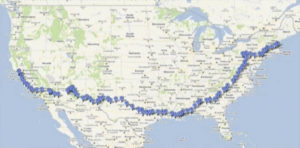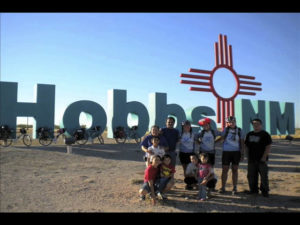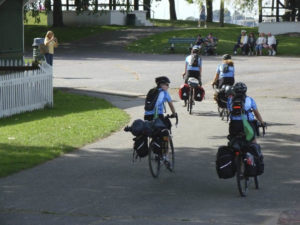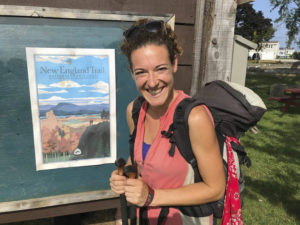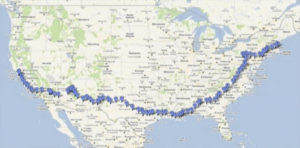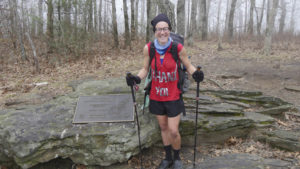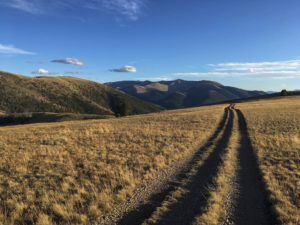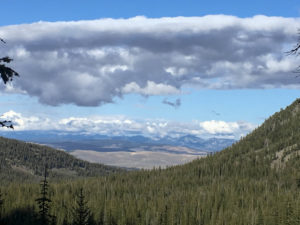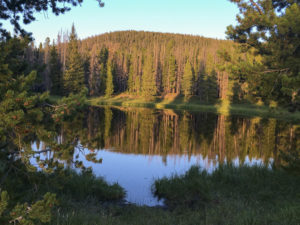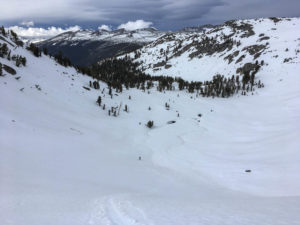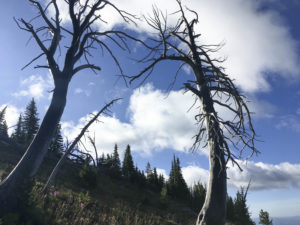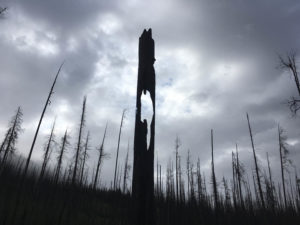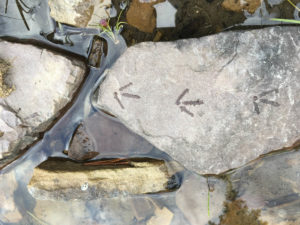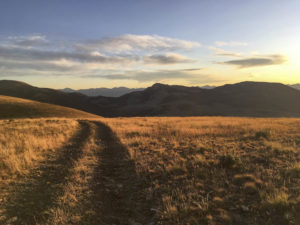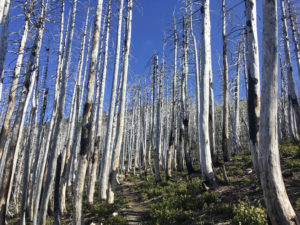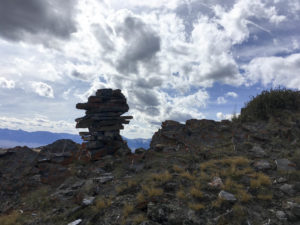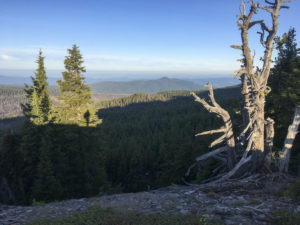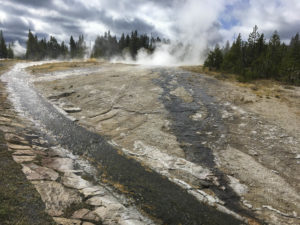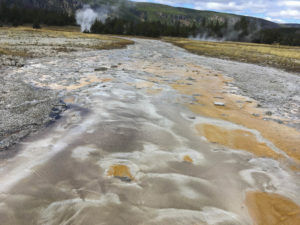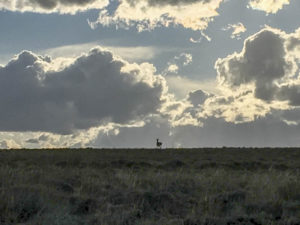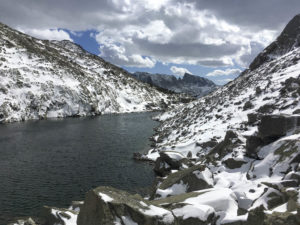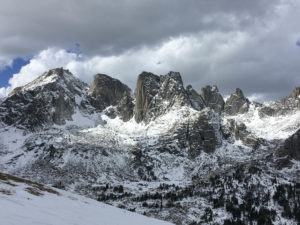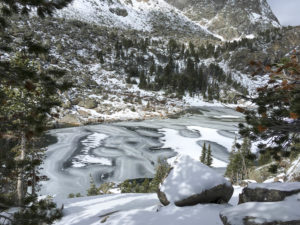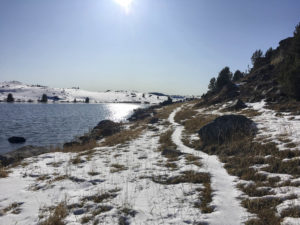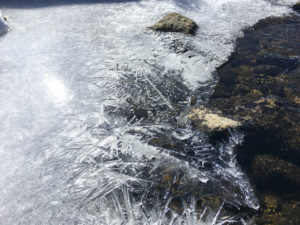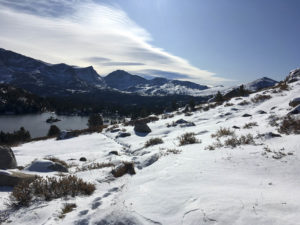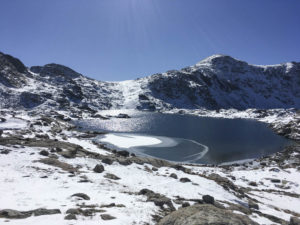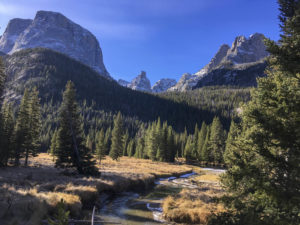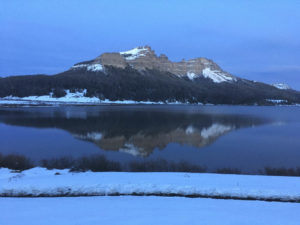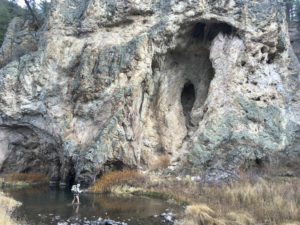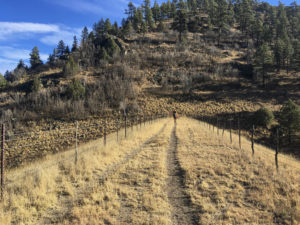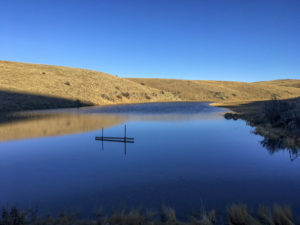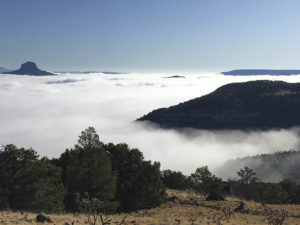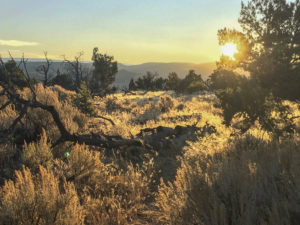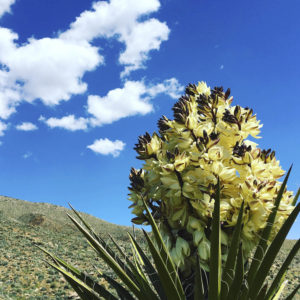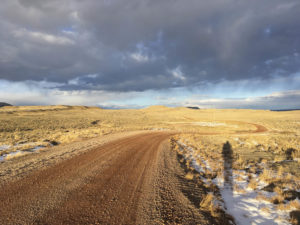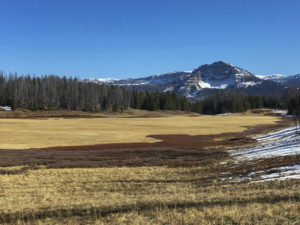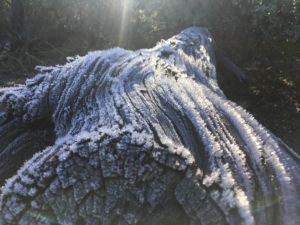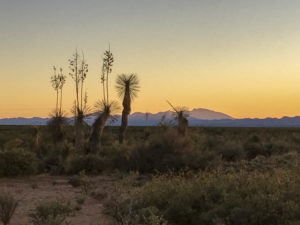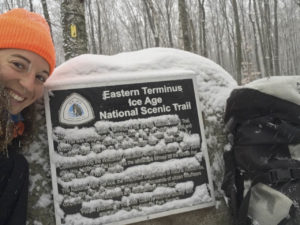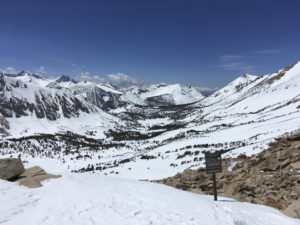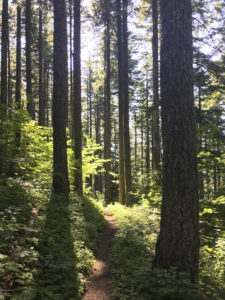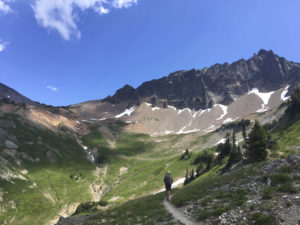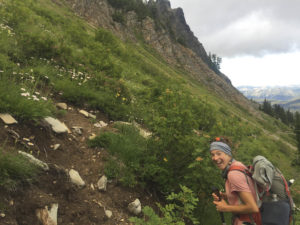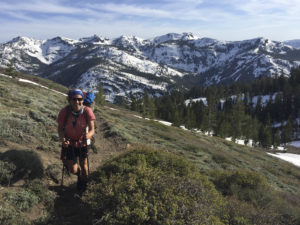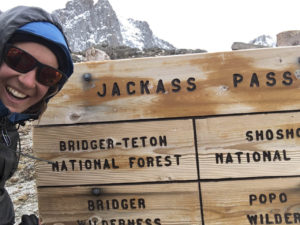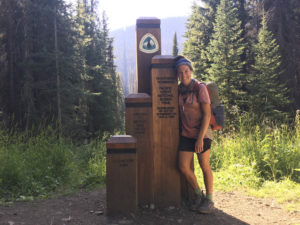JeanMarie Gossard has been an EMT in Bolivia, a youth empowerment volunteer in Zimbabwe, lead large field teams in the fight for marriage equality in multiple states, peddled her bicycle from Salem, Massachusetts down to New Orleans across the southern United states and ending in San Francisco. In the last three years she has through hiked over 11,000 miles including the AT, CDT, PCT, Hayduke trail, Florida Trail, Ice Age Trail, and soo many others. She shares memories and lessons on how to live the fullest life and never letting others hold you back.
Below we have Jeanie’s resume of trails, LGBTQ advocacy work, some poetry, and pictures from Jeanie, including the map of the route she took across the south when she bicycled across the continental United States. You can learn more about her on her website and definitely follow her adventures on instagram @jeanmariegossard. If you want to hear more about Jeanie’s organizing efforts, check out her interview on our podcast for organizers and activists at Ocean of Organizing.
TRAILS JEANE HAS HIKED IN THE LAST 3 YEARS
CDT 3,100 miles
PCT 2,650 miles
AT 2,200 miles
Ice Age Trail 1,200 miles
Florida Trail 1,000 miles
Hayduke Trail 812 miles (didn’t get to complete because a boulder fell on her foot and broke her toe)
Arizona Trail 800 miles
El Camino de Santiago 500 miles (partial)
Pinhoti Trail 337 miles
Long Trail 270 miles
LGBTQ ADVOCACY
Campaign Manager Freedom New Hampshire – supporting transgender non-discrimination protections
Field Director Freedom Massachusetts – supporting transgender non-discrimination protections
Northeast Regional Lead Organizer for Why Marriage Matters Ohio – supporting marriage equality
In-district Organizer Freedom Indiana – supporting marriage equality
Statewide Canvass Director New Jersey United for Marriage – supporting marriage equality
Assistant Canvass Director Rhode Islanders United for Marriage – supporting marriage equality
Volunteer Organizer Mainers United for Marriage – supporting marriage equality
POETRY: ANCESTORS
What if our ancestors were in the clouds
ghost walkers circling snowed summits
calling us forward to even higher peaks?
I don’t usually think of you out here, but today, after climbing a mountain full of my fears –
as I scurry down to safety
I miss you – remember
your excited eyes two inches from my photographs,
your curious traveler’s heart, interested, eager.
Then I look up – another snowcapped mountain –
I want to see myself the way you do
boundless strength
dream tackler
stronger than we were ever told.
It’s funny how fear pollinates our cells
without our permission
pouring doubt into crevices
we only recognize once they explode,
shatter into tiny pieces,
return us to the knowing underneath.
POETRY: THE WIND RIVER RANGE OCTOBER
Have you ever heard a mountain say no?
Watched your steps upward turn skyward?
Peaceful white flakes turn to pellets, drive down in gusts.
Clear ledge to my right now gone, snowed top now one with the sky,
each step I lean hard, brace myself against wind until all is white,
until the only proof of my existence is
my pumping terrified heart,
my iceberg toes.
I brace and brace until I realize there is only retreat –
stumbling slippery steps back down
to the tree I hope is still there
to shelter me from 30% of this roaring wind.
Up here, that’s something.
I lie in my tent
with tingling toes,
and a hope, prayer, wish
that tomorrow,
when I unzip the door to the day
and look up,
her stone gabled top will be sharp,
clear against a blue sky,
bright,
even welcoming.
POETRY: ANTS
What must it feel like to be stuck in the folds of a rain jacket?
Tiny red ant – right turn, left turn, quick twitches, sudden micro movements.
Is it the panic I feel when I can’t take a full breath inside my sleeping bag?
Or is it more adventuresome than that –
traversing smooth tilting and lifting creases like a marble in a maze
or water dripping from one smooth leaf face to the next?
I looked down, found I put my rain pants right in the middle of their marching path –
a workforce suddenly faced with ascending slippery black peaks,
a mountain range plunked right in the middle of their desert.
Are they frantic?
Or just calm and quick – making important split-second decisions with confidence?
Up we go to the summit,
one step at a time.
TRANSCRIPT OF EPISODE
JeanMarie Gossard 0:00
I was weeping. I was like weeping for the opportunity to have had that moment and wouldn’t have been able to have had any of those moments if I’d listened to other people. And if I’d listened to the doubts in my own head
Intro by Kevin Oates 0:18
from dirigo collective This is renegades in Mavericks, sharing the stories of people interrupting the status quo and breaking new ground in their field.
Benn Marine 0:31
I’m Benn Marine. And in this episode, you will hear life lessons through rich stories from Jean Marie Gossard. If you look up the definition of a maverick, you’ll find a description that sounds something like this, and unorthodox or independent minded person. By the end of this episode, I think you’ll agree that Jean Marie Gossard is a maverick in every sense of the word. She has bucked the status quo from a young age often to always follow her inner compass in lieu of a steady paycheck. Genie has been an EMT in rural Bolivia, a youth empowerment volunteer in Zimbabwe peddled her bicycle clear across the continental United States, fought for LGBTQ rights on campaigns as a leader managing large teams in Maine, Rhode Island, Jersey, Indiana, Ohio, New Hampshire and in her home state of Massachusetts. And in the last three years, she has hiked over 11,000 miles. She’s been on the Appalachian Trail the Pacific Crest Trail, El Camino de Santiago in Spain, Hayduke trail, Florida trail, Ice Age trail and too many more trails to name. She’s a published poet and a true testament to carving your own path and learning to dance with the voices of doubt in your mind. Activist. Long distance hiker. Poet. For Jeanie these are just a few adjectives that describe where she has been, for no label can restrict or hold her back from where she’s going. She is a maverick.
I’d love to hear some of your strongest memories and how they have shaped who you are.
JeanMarie Gossard 2:04
Well, that’s a really big question. One big memory I would say that shaped me was I think growing up as I was definitely a tomboy, and I was a very shy kiddo. And I still remember the first time at recess when I was like five or six years old, going up to the field of soccer players that were all boys and asking to play. And I still remember like, my heart beating in my chest, and my throat and like my head, you know how that happens? It was like, literally just to muster the courage for the three words, four words, can I play too. And I think that experience of just that, that nervousness, but also that like deep desire to just do the thing that I love to do, was sort of the begining of learning that… that feeling when when your heart is pounding in your chest and your throat, to follow it. It was also those memories are all linked together with learning that the way the world sees you can be at odds with the way you see you. Because I’d always thought I was good at soccer and I really just I just loved it and then the boys would be like, well you’re a girl are you even any good? And I remember that was my first kind of face to face with the world seems to think that I’m not as what I what I know myself to be.
Benn Marine 3:35
You’ve done a lot of advocacy work both abroad and domestically. I’m curious, do you have any memories from a young age of feeling the need to speak up?
JeanMarie Gossard 3:44
The first time I was being a lover of I was a total shy door loved just watching bugs and like playing with bugs and being outside and I remember the first time and at school everyone anytime there was an insect Like a bug in the classroom, people would freak out and be like, we gotta kill the spider. And I remember the I would really mostly just sit quietly and kind of feel really sad and again that heart beating in my chest and my throat and I remember one of my strongest memories is the first time that I actually did something you know, there have been moments that said, well do we need to or what some something like a silly pitiful speak up that never worked out. And I remember the first time I actually just put my hand over the spider and the kids foot I remember his shoe like coming down on my hand and you just like quickly souping the spider and like leaving the room. And to me I feel like that’s just totally like, shaped me because I realized you got it. You got to do things like you have to take action or nothing changes.
Another big memory. I went to really diverse high school and I ran around with a crew of kids of color and Latino guys. And then when I went to college in a small liberal arts school in Maine, everyone was white. And like, not everyone, but the vast majority people. It was the first time that I realized that the world as I knew it really wasn’t actually fair. I just thought the world was a place where everybody got along, and everybody mingled, and there wasn’t segregation, and all of this ridiculous stuff. And it was about the same time that my cousin actually came out as being gay in Memphis, Tennessee, and had a horrible coming out experience. And it was also the same year that my church went open and affirming. And I was, I was young, a young teenager and I remember asking my Mom, what’s, what’s going on? And she said, Well, we just decided our church just decided that we would marry gay couples. And and then I watched half our congregation leave the church because of that decision and so that coupled with my experience of essentially systemic racism and you know, access to the things that I had always had access to really changed my perspective, and I realized that the world wasn’t the this like idealistic, beautiful childhood that I had lived.
The first time I traveled abroad to Peru, and I did a kind of like a mini Peace Corps program where they set you up with a host family and then you volunteer. And I was placed in a nutritional rehabilitation center, and I was all, you know, excited to help. And I thought I was just gonna, I had so much to offer. And I showed up there and there were these kids and it was basically a center for kids that generally lived on the street, but they could come for two meals a day and essentially be under the care of supervisors and Their parents pick them up later in the day. And I was fresh off of summer camp and like developing youth and character development, and I had all these games and programs. And I was struck by how much time these kids spent on the television. And I was like, we gotta, we got to get in there. And I have all these ideas for how to better this environment. And I remember the head of the nutritional center sat me down one day, and she said, What do you think our center needs the most, and I had this whole plan. And I remember I was super nervous, and there was some little piece of me some little wise piece that said, I think I was just stalling. But I said to her, Well, what do you think the center needs most? Mostly, I was just stalling, so I didn’t have to share my ideas yet. But thank goodness, I asked that question because her response was, well, the kids definitely need shoes. First and foremost. That’s how a lot of the parasites are, they’re running around in the streets in the dirt. And that’s how the parasites are entering their system. And then we need parasite medications. And then I would say the third most important thing is a second pair of pants because a lot of these kids are sitting in their own pee all day because their family doesn’t have enough money to buy that second pair of pants. And as you know, Peru is cold. It’s not actually very warm here. So these kids are, it’s contributing to them getting sick more often. And then she’s like, what do you think? And I’m Like, that sounds like a great plan! I’ll get right on it. And I remember like, you know, and then I went back to friends and family and raise some funds and did the things that she had said, but I just it was, I think single handedly that memory changed, entirely changed the way I saw the world, where I saw my my place in it, and definitely cured me of the white savior complex of like, if there are these problems that had been in this community for decades, that still hadn’t been solved. What an earth I’m thinking like my 19 year old self could do in three months for a community that wasn’t even mine. So that was a pretty important lesson that then shaped as I did international work thereafter, it really shaped the way I I kept seeing the western approach. The idea of coming into communities to help and do good with good intention. Really, there was so much more gray and […] A lot of times I saw more harm being done than good. And it was it was my first really big lesson in listening. Like the importance of actually listening to communities and to people and not just seeing not showing up and looking at a community for what it lacks or what it needs. I started to wonder, what if, what if we took the opposite approach. I found this incredible village in Zimbabwe that was doing just that. They were they were locally run and they were doing empowerment work in their local community. And their belief was that real change came about from seeing what we already have in abundance. What? What do we have that we can use to grow our dreams, as opposed to what do we lack? Which I think is a much more Western approach to international development. And so that was an incredible thing. Because when I went to Kafunda, this learning village, they called me up and they said, we see you’ve got some great experiences with facilitating leadership, development and working with youth. We’d love to have you join us as a as a learner. But we want you to know that we don’t need your help, and we don’t need your money. And we don’t actually need you at all. But if you’d like to come and like learn from us, and take back what you’ve learned to your community, we’re we’re open to doing that and you’re welcome to come. And I think that really changed the way I saw the world.
The last few strong memories that have changed my life. Were a cross country bicycle trip. I did with three other friends and we’re raising money for a scholarship fund for our summer camp. We experienced so much kindness from complete strangers of all walks of life, all demographics. I remember being taken in by a couple that was really skeptical, like what are you doing here? You know, why are you cycling the streets of Georgia and they said you know, you can say in the backyard, you can put your tents in the backyard. And then by the end of dinner, they had moved from you can stay in the backyard to you can stay in the garage to you know what, just come into our guest bedroom and connecting with people across different time and time again on that trip was really in affirm what I already believe somewhere deep inside, which is that we are humans are inherently good and I remember when we left them, we spent two days with them. And then when we left we were all like, Misty eyed these these people who were complete strangers had become I felt like I was leaving my parents and, and yet, you know, their political backgrounds and their backgrounds in general. Their life stories were so different from ours but I think that’s where I started to learn the power that connecting across difference and sharing your stories with others can really do and we were living we were put up by one night we were literally put up an oil tycoon put us up in a hotel. And then the next day we stayed with a Mexican American family that was living in a trailer and they made room for four women in their trailer. And they had like five kiddos and everyone was running around the house and it was super was super cute. And it just totally was just I just felt like we saw America, we saw the United States and our own country and the goodness of people was really firmed.
Benn Marine 13:00
What route Did you guys take on that bike trip?
JeanMarie Gossard 13:03
We actually went, we did kind of a smile, I guess I call it we wanted to see New Orleans and we want to see the South because so many of us had not seen the southern United States. And so we went down to to New Orleans and up. And that was, I think, the best choice we ever made because a lot of people go straight across. And so bicyclists are like, no, it’s Oh, you’re bicycling across the country. But where we were in like boonie, Ville, Georgia, Mississippi, Louisiana, Texas, Arizona, people were like, What the f are you doing? I mean, because they just had to see no big no and like us. So I think that also creates sparks this ability to create and I mean to connect across lines that wouldn’t have happened if we’ve taken a more direct route. I mean, that that kindness that belief in kindness was also carried over I had a lot I have a lot of strong memories from long distance through hiking Similarly, I think the way we treat travelers, if we were able to somehow treat each other on a daily basis with the kindness that we treat travelers, I certainly felt that in bombed the trail as well, for sure. And then the marriage movement is full of incredibly strong memories of the power of stories, which has personally shaped me in terms of, I really kind of believe that’s one of the most powerful things we can do is share stories. Thanks for getting people’s stories out. That’s like what you’re doing.
Benn Marine 14:26
It’s the most fun, it’s the most fun. So you also spend, you know, as you’d mentioned, years doing international humanitarian and environmental work, and then you transitioned to domestic politics, advocating on behalf of LGBTQ community. I’m curious, what kind of sparked that shift or that change in direction and was it an uphill battle? Or did you feel prepared for it?
JeanMarie Gossard 14:51
Um, it was kind of a, it was a perfect transition the way it went down. Like I said, these incredible learning communities that I’ve been in the one in Africa And then in, in Zimbabwe, and then in India, were totally changed the way I thought about the world. And I thought I would stay in India for a bit long here. But the reality was these incredible communities that believed in cross pollination, you know, learning from each other, and then bringing your ideas back to your community and implementing them there. And thinking about how they could fit in your community, as opposed to the economies of scale that we see in most international work was, which is well, it worked in China, let’s, let’s throw it on Haiti and see how they do. And let’s try to make everything as big as humanly possible. I, those communities helped me see the power of small community, and what that can really do to affect change and ripple out into the wider world. But the funny part was, I didn’t have a community like I was part these places were incredibly welcoming and wonderful, but at the end of the day, like they weren’t my community. I was still just like, ya know, this white American like hanging out with the Indians and Africans and trying to figure out where where I fit. So when actually my brother had his first child and asked me to be my niece’s godmother. And so I decided to come home, which I’m so grateful I did. It was kind of like a heart wrenching experience at the time because I loved India, so much in the community. I was in there, but I came home and a few weeks after I got home, I got an email that said, don’t have money, but have time. Come volunteer with us in Maine to ensure that same sex couples have the freedom to marry. And I was like, Oh my gosh, this email is written for me. I’m going it was like it was such a black and white was what was so refreshing about it was I just come out of international work, which I have decided was just this field of gray. Right? Like, are we really doing any good? What is my role here? Am I even helping? Am I actually hurting? How are we erasing you know? cultures by just bringing in white Western influence, yada, yada. When I got that email, it was like black and white. There’s no question. This is a matter of right and wrong for me and it made my blood boil. So like thing I remember how live I felt like running from door to door in Rhode Island. And it was that same, that heart beating in my, you know, beating in my throat to talk to people, to hear folks has stories to take all the stuff that I learned abroad and finally, find my own community. So it was comically not an uphill battle. It was like, I think a perfect alignment of passion skill and doing something that made me feel alive.
Benn Marine 17:45
What brought that next transition to essentially full time through hiking? What spurred that transition?
JeanMarie Gossard 17:52
Yeah, um, well, wildly enough. I basically, I actually took to the woods, you know, to the Appalachian Trail to recover and recenter from burnout, which came about, I would say around my fifth campaign. And then I started being like, Okay, this is my last campaign. This is my last campaign. And then by the eighth campaign, I actually like my friends and family kind of had intervention and they were like, a Jeanie, you know, you’ve lost yourself here and we want you back. So I had been struggling with burnout and decided to head to the woods. That was what I remembered I enjoyed doing for being a kid. I was like, I think I remember like tight but literally, my life had become my work. So I really didn’t know who I was. I realized what I did have free time, which was never but when it did happen in the world of campaigns, I didn’t I didn’t know what to do with myself, I really would and then I would just kind of like sit there and then start working again. So I’m heading to the woods was my way of re-centering and I thought I was just going to use it as a place to transition to the next day I find myself soul search, you know, the cute little story and then I just totally fell in love. I had no idea that the trail was going to bring me what it did I and it’s so hard to describe myself like a total goober. But I literally woke up every single day on the Appalachian Trail without exception. And what I would call a state of, of bliss. There’s really, that’s the only word that like kind of comes close and even there I’m like, I don’t know, cuts it. Like I was just I was living breathing. I was waking up. I was writing poetry, I felt it was such a gift to be able to, to see to really peel back the layers of like the question Who are you? At the end of the day? When you turn out all the lights like what is your soul? What does it look like? I felt that I really found that in the woods. And it was really kind of a spiritual awakening of a sort that I could I did. I had no I wasn’t even ready like it hit me like a train. This is the best possible decision I’ve ever made. And I didn’t even know it would be when I made it and, and then kind of comically I started walking ever since. So, because I didn’t really want it to end, but
Benn Marine 20:22
did you ever have, so with that through hiking, so it was what, like three years that you were through hiking ish?
JeanMarie Gossard 20:29
Yeah, give or take yeah, yeah.
Benn Marine 20:31
Did you ever have moments where that bliss really like, ebbed and flowed and like, did you ever struggle like struggled to maintain that bliss?
JeanMarie Gossard 20:41
Definitely. Yeah, definitely. I would say the I mean, the Appalachian Trail though. No, the answer is no. Like, the the whole time. I was in bliss. It was really ridiculous. And then of course, I kind of chased that feeling thereafter because I did want to sustain it. And I did feel that there was more work to do there. But ya know, that’s Feeling wasn’t as I did more and more trails and said more and more time and solitude peeling back those layers you know at some point you’re like okay, maybe this is it like all I have to learn about my soul No, I just kidding. I do think that process is endless but those moments of feeling really connected to like the essence of what it means to be human that I would have on the tops of incredible peaks mountain passes in the forest by water. They were so much more common than I think the average person but they weren’t. They weren’t constant by any. Of course not. And I do think I was kind of like, wishing that they could be, that I could that I could relive the Appalachian Trail again and again, right like that would be incredible. But I think as wise people share, you know, spiritual gurus and my mother, you know, the path of like, wouldn’t you find a spiritual path or you find a practice that like, helps you grow in self growth and self discovery, the day to day, there are just many steps that you take in between those moments of enlightenment that are not easy steps and but it’s about taking them anyway. And I think that was what walking became. So I was able to really balance both and and find joy. And I really did find joy, like, in all the times that I wasn’t having epic breakthroughs and epiphany and stuff, I’d still just loved moving my body and being surrounded by beauty and what I felt was the divine and the wall around.
Benn Marine 22:35
That’s awesome. I mean, in all that time, I imagine that you had long periods of isolation. What was what was that? Like? How did you navigate that? And do you have any advice maybe for folks who are experiencing isolation right now in our time of COVID-19?
JeanMarie Gossard 22:52
Totally, um, yeah, so well. hilariously in the beginning. I don’t know personality type. Saying that I’m like an introvert extrovert, like I’m right on the line. And I think my introvert after campaigns after so many hours on the phone, talking to people, people, people, people all the time, by the time I talked to the woods, my introvert was like, get us out of here! you know, like we need, like space and time. And so I really thrived on solitude. That’s not to say, I don’t want to deter people who think that going into the woods is all about solitude. It really doesn’t have to be some of these big launches, especially the big three, the Appalachian Trail, Pacific Crest Trail, that kind of divide. Lots of people take to the trail. There’s even like there’s kind of a bustling trail community of hikers, people from all over the world and then the incredible trail communities that surround the trail that like if you want people you got people like you can get ’em, but I didn’t want people and I found that I was literally I kid you not I would, I would like run on the trail. When I pass someone I would speed up significantly, just to ensure that I didn’t have to wait If that person again, and it’s not because I mean, these people are incredibly, incredible, but I was just, I was obsessed with solitude and I am connecting with nature and all this poetry that’s coming and I just, that was what I was there for. And I like ate it up. I mean, I just drank in solitude. I even wrote a poem called chasing solitude that was about the frustration of like, oh, there’s so many people in the woods. I mean, come on. Like, that’s not like comical privilege anyway. But anyway, I was really so to me solitude was a dream. Now, I recognize that a lot of people do not have that same dream. And I have had friends especially during the pandemic asked me Hey Jeanie, like, what’s the longest you’ve gone without a serious connection with someone deep conversation? I’m like, four to six months, and my friends are like, Oh my gosh, it’s been one week. I don’t think I can make it. You know, and, um, so, I think I, I guess my advice though, would be that this is a time… Because so there’s it’s very different, obviously choosing to go into the woods being surrounded by beauty, there are living things all around you so different than being cooped up in your home, and not really having much choice around that. So obviously super different situations. But I do think that this time is kind of wild in that we have been stripped of the things a lot of people have lost their jobs, but people have been stripped of the ability to work around other people and even to be around friends and family. It’s and so it is, it’s not a bad time to be asking that question. Who am I? When everything is gone? Who am I without my work? Who am I without my friends and family peeling back that question, Who am I and what are the pieces of my life that I want back when this at least becomes more under control? And what life do I really want? I think it could be an opportunity for that. It’s so much easier said than done. And like I don’t know Meditation has helped me. But I do not like being cooped up. And I know it’s super super hard for a lot of people. So my heart goes out to everyone.
Benn Marine 26:11
Did you find on the trail that there was stuff that you were parts of yourself that you brought to the trail that you intentionally left behind? Or Or was it more just kind of discovery? reflective time?
JeanMarie Gossard 26:29
Interesting. Um,
I think it was more discovery, more discovery and reflective time.
And I what I was finding was that for me, poetry had always been a method of catharsis, when like something big happened in my life. And what I found on the trail was it through poetry, it was almost my like medium for continued self discovery, and for peeling back those layers and understanding what has made me who I am and, and, and who do I also want to continue to be. Yeah, I don’t feel like I left too much behind. So you kind of brought it all with me and then was able to sort of through, like, what has been most meaningful?
Benn Marine 27:10
Can you maybe I’m putting on the spot here a little bit. Can you maybe describe some of your favorite moments on trail?
JeanMarie Gossard 27:17
Oh, gee! Benn! Yikes…. No, no, no, no, um, you know, one one that’s just coming to mind right now. And of course there are tons but one is coming to mind was somewhere in the Appalachian Trail I think I know I was in the south and I was I found the coziest cutest little Grove there were all these little green plants around and I was isolated from the trail so no one can really see me. And I felt like I found this little cozy place to pitch my tent and it was right by stream and I love running water. So I could like walk to the stream. hang out and I decided to stop early because I was just kind of loving it and I woke up in the middle of the night I remember waking up in the middle of the night at midnight and I got out of it I always have to pee at night so I got out of my tent to pee and I was all like oh you know because I hate interrupting my sleep so I was like I have to pee again but I got out and the moon was blowing up the sky and the stars were everywhere and I just in the moon was so bright that it was lighting up. It was illuminating the the shadows of the leaves like all in like the canvas of my tent and I got out and I just and then I wrote a poem like at midnight like it just kind of like vomited out of me just like came welling up and I you know so I’m just lying in my tents or just seeing the beautiful night sky I crawl back up I crawl back into my tent and I and then I was able to get out a lot of the emotions that I had just felt in that moment, which is something I, I’ve never really can do. They always come later. And they always like, come in forms I don’t want them to exist in. So it’s like a really special that was a special moment. And I remember a similar moment random similar moment on the Ice Age Trail in Wisconsin. This was different because I was freezing, it was freezing, I was sort of more miserable. And it was not in a cozy little nook. I was like on the side of the highway in like woods that I was hoping were public land and not private. And I woke up in the middle of the night and just got out a poem that was about some like really a really painful breakup from like seven years ago. So it’s just kind of wild like what what moves through when and and what sparks it. I mean, I had a lot of moments that felt the same in different ways. On all the different trails. I there hasn’t been a trail that I haven’t had a moment where I come up to beautiful Vista. I just start to weep, because I’m overwhelmed by gratitude for being able to exist in that moment, be alive and like that this is my life. It’s like, Whoa, just cry. And that happens like pretty much at least once every trail If not, like many times in a trip.
Benn Marine 30:19
That’s awesome. Thanks for sharing those. In so your life has been rooted in experiences and careers that may trigger fear for individuals, but you face them head on, has fear ever been an obstacle that you’ve had to overcome towards your accomplishments? And what role do fear and risk play in your life and career?
JeanMarie Gossard 30:41
Yeah, well, definitely, I fear has been has been there for sure. And, you know, there’s all these great quotes out there. A lot of people say, you know, being brave isn’t about the absence of fear. It’s about how you move through it. And I definitely have felt on trail especially This past year, really being kind of up against the line and very physical, the limit pushing experiences and feeling just how fine that line is between fear, saving your life and also being able to end it.
Benn Marine 31:19
Can you walk us through an example?
JeanMarie Gossard 31:21
Yeah, so Oh man. So I had an experience in the Sierra Nevada Mountains where I was in whiteout conditions at really high elevation. I’d never been in that kind of situation before I was completely like, I could not see my own feet because of the wind and the snow and just how blanketing it was and I was, I was some I was summiting a mountain as well. So there were elements of like, edges, you know, drop offs that I couldn’t actually see. So it was it was like, it was very terrifying. And then I found myself in a situation where I couldn’t backtrack. I was actually stuck because I got stuck on a ridgeline basically is what I’m trying to say and I had a mini… I like to say that I moved with the snow I was in like a mini avalanche but it was like a really small It was a very small like slow moving avalanche I knew that it was like going to it was not a full blown avalanche just to like be clear and so I knew I knew I was going to survive that but then after that I was like alright, I need to get out of here because the snow is unstable and I need to get down and I’m in a pretty serious pickle because I can’t I can’t backtrack and I can’t go forward because there was like a wind shoot and then backtracking it was the same deal so it was like I had sort of trapped myself. So I had a moment where I was like I need to pitch my tent because I’m getting too cold and I can’t move anywhere. Really it’s funny to pitch my tent but then like snow is blowing into my blue into my right on top of my down sleeping bag which is like a kiss of death for an outdoor person who’s using that to survive. And I had a moment of basically panic, right? fear fear that turns to panic, that’s sort of what I’m talking about when I say it can kill you. But then I was able to I’ve had my moment of panic, did some tears, and then was like, I need to, I need to not die now, like I need to figure out how to not, you know, to not succumb to that panic and let that fear crushed me. But I also need to listen to it like I’m not going to just stay here and set up camp for four days for a four day vacation in the Sierra without water, or access to food. So like, in that sense, that’s sort of what I’m talking about is like that line between fear as a motivating force to save your life and to help you ascertain good risk, healthy risk from bad risk and then and then also to not let it crush you. And so and then I was able to get out I was able to descend to a lake, like a high mountain lake and get out through a valley because I had I literally had one bar of service and I was able to call a local person. I was very, very, very lucky. And I didn’t have to, I considered pressing my emergency button. But it was also the kind of conditions where as an EMT, I was I didn’t want me dying to be the reason that three other people died too. So I you know, it was it was what I mean, that was certainly fear was having there. And I would say that, but the beauty of the beauty of walking, long distance hiking was that a lot of it is just about whether or not to take the next step. Well, it’s can be really challenging at times. It’s also there’s something very innate to me about that. Like, there’s been so many moments where I’ve just, you know, I’ve just taken the next step, even though there was a lot of, you know, there was fear right now, I just recently made the choice to try to give back to the land and the communities that I have spent so much time in and I’m trying to be a wildland firefighter and I leave in two days for Alaska to Do that and in the interview process, these guys very stoic badass Alaskan men, like, how do you feel about being the only female potentially on the squad? And it brought back up it was like I was back at recess. It was like I was five years, five years old again and there’s all these physical requirements and and all these expectations and I think that fear what I learned in the Sierra and a lot of moments of hiking has been that in life in general has been that there is like no end to the doubts. I thought it was a pretty empowered person. I’ve I’ve done I know I’ve done I’ve, I’ve walked ahead in the face of people telling me not to, I’ve you know, but there have been so many moments on mountains on high mountain passes in the snow where I am weeping not at with pride that having accomplished something but with that feeling of empowerment that comes where I was like, oh, my goodness, I did not know that I could do that. But then of course, there was some tiny little voice that somehow did, right? That kept putting that foot in front of the other. And I think it’s that that little kid and I think as I look, to, to fire, there’s inherent risk, of course, in the job, but then I think, to me, there feels like there’s a lot of risks, because all of these beliefs about myself and about what I feel are true are really going to be put to the test, I think, in a way that really scares me, but is also part of the reason why I chose this particular crew, because I do think that I learned a lot this year about how much risk and that feeling of just comfort can push you to places you never knew were possible for yourself and I’m excited. But I’m terrified.
Benn Marine 36:52
And that in that particular crew that you chose too is one of the most challenging in in the country, right. Would you say is that feel accurate?
JeanMarie Gossard 37:00
That’s what some people have been saying. I mean, I’m so new. I’m like a total newbie to this whole field. And so I really can’t like I cannot say that with any sort of authority. But people that have been in the work have told me that, yeah, that they’re pretty serious Alaska one guys said, he was like, oh, Alaska, well, everything will feel easier after that. Like, I feel like a goof that, you know, I thought I was signing up for like ROTC, and then I’m like, training for to be a navy seal all of a sudden, you know, like, I didn’t, I kind of just fell into it. I wasn’t like, oh, let me go try to be part of the hardest, you know, that was not my intention at all. And in fact, I can easily and quickly learn that. That’s not my jam. But I think it’ll be a good experience just to find out so and
Benn Marine 37:43
I think that that kind of exemplifies how so many of your decisions are the exact opposite of what maybe society would expect, which is awesome. Have you faced pressure from your community to conform to certain lifestyle?
JeanMarie Gossard 37:57
Oh, man. Um, Yes, I was. Definitely, for all intents and purposes, my lifestyle especially lately, has been moving further and further away from the norm. I love to shoot I love stories and like happy ending stories. But the truth is like I have certainly lost. I have certainly lost friends and grown apart from people because of the choice I made. I missed a wedding of a friend on the Appalachian Trail. And I don’t think I’ll ever forgive him for that. And I think that it can be tough. It can certainly be tough, and I definitely had a wild experience with a friend’s aunt, a good friend scan who asked what I was doing, and I said, I’m going to walk for a year I’m trying to hike the Pacific Crest Trail on the Continental Divide trail this year. And she said, the Pacific Crest Trail she said I read wild and you could die. But that was just like her. And then she said she, it was so funny, she said you could die and then and then in the next breath was like her face changed from you could die to this just intense judgement I rarely see in complete strangers, she turns to this complete look of judgment. She said, What are you running from? Wow! This woman’s really coming at me! Well, my response which I, I still believe to be 100% true was, I actually feel for the first time in quite a while that I’m running straight in the direction of my life that I’m running toward my life. And she didn’t really respond to that. And later, she actually apologized, she called her niece back up and said, I want you to tell your friend that I’m sorry that I kind of freaked out. So it hasn’t always been easy, but it has been for the most part, I have been so grateful. I have had such a network of support a lot of like pseudo parents in my life, and I’ve gotten closer to people who, that’s the cool part is that on Instagram, I found people I didn’t even know who are telling me that they are so inspired by what I’m doing and a lot of people who are living vicariously through people who do outrageously weird stuff. It’s like, you’re not that weird, you know, that, like brings out the other weirdos. I mean, I it’s like a wonderful, beautiful thing I’ve become closer to my uncle who’s very into being in the outdoors and has run lots of races. And yeah, you lose some folks but you also learn the people that are there for the long haul that are willing to lean into discomfort. And willing to really see you for who you really are. And then that’s made my life so much more full, I think.
Benn Marine 40:30
What have been some of the most challenging and rewarding experiences you’ve had and how did you overcome them or navigate through them?
JeanMarie Gossard 40:40
Oh, man, um, well, this past year, I slightly touched on it. I headed into the Sierra Nevada Mountains in late April, which is not super advisable. And it was a super high snow year. So I’d urge Because I knew I was getting an early start at the PCT, I intended to leave and go somewhere else as soon as I showed up too early to the Sierra Nevada Mountains. But what I found was that on the way from the two high mountains that came before that, that were totally drenched in snow, a lot of people were going around them. I found someone who had mountaineering experience, and he kind of helped me learn how to how to utilize some of these skills. And I found that on one of them, so I he taught me some skills and then on the second mountain, I did it completely by myself. And that was one of the first moments on the PCT where I wept. I would told you I had a moment where I just wept at the top of this mountain because I had never, never used an ice axe before. I didn’t even know what crampons were. I was like a goof but I was so in love with being there. And by the time I got to the top, I was just weeping because somewhere inside of me there had must have been a little voice that was like, you can do this. But yet there was a bigger voice And equally existing voice that said that had really believed I could not. And so, by the time I got to the Sierra, that those voices were still ringing in my head. And so we’re the voice of all of these people all around that were saying, you know, don’t go into the Sierra, you will die. Like, it’s like, yeah, it’s really not smart, all this stuff, but no one had been there. No one had actually been up into the mountains yet because it was that early. So there was a lot of fear mongering and a lot of there was a lack of information. And I just decided, I don’t know, you know, I think it was that that heartbeat in the throat, like I just decided I’m going to go I’m just going to check it out. And I’ll probably turn back after like, a couple days. Because, you know, it probably will be like everybody said, but at least I will have just seen, just seen what’s up there. And then I found myself, you know, 10 days later, like I’m still in the Sierra and I’ve gone over five of the highest passes. That was when I totally wept again, because those were the big things that people were talking about that involve mountaineering. It’s like, you know, ice axe type work. And I, it was I have I have something called Raynaud’s, which is like a circulation issue. I hate the cold. I’m a total wimp. Like I literally I am a wimp when it comes to cold. I totally hate it. And I had no, I really did not think that I could live in the snow. I ended up living in the snow for a month. I did not see the ground. And it was simultaneously certainly one of the most challenging experiences I’ve ever had in my life. And also, I had so many moments where I was in such extreme beauty that I was weeping, I was like weeping for the opportunity to have had that moment and I wouldn’t have been able to have had any of those moments. If I’d listened. to other people, and if I’d listened to the doubts in my own head, so that was incredibly rewarding. And of course, there were tears. There were like empowerment tears, and then there were like, my fingers and toes are freezing. This was stupid tears, for sure, too. So not to say that but like, I think that’s the beauty of challenge is like how they can live together.
Benn Marine 44:22
What so what would you say to someone who may be struggling to break out of a rut or go against the grain or try something new? Or maybe it’s running into those voices that you’re talking about? Right, like those voices of self doubt, and is having a hard time just getting out of their own way? Like, what would you What would be your advice for those folks?
JeanMarie Gossard 44:40
Ah, advice is tough because you know, when you give it like, it might even if it sounds a little good, it’s so hard, it’s so difficult to actually do. Um, but I would say, I would obviously say do it. I feel like my life has been that lesson to me. In terms of little tricks, I mean, I certainly I’m a huge fan of trying to trick your psyche into doing things that challenge you. I mean, I literally went to Sierra, I told you, I was like, I’m just gonna go for a couple days. You know, I was like, I’ll go for a couple days, I’ll turn back. It’ll be great. And then, you know, and then trusting that when my body got there, it would be able to really know, can I keep going? Or can I or should I stop? And so yeah, I think I would tell folks do it, do it, do it, do it. And whatever you can, by whatever means necessary, right? If that’s like just telling yourself to take that first step, it’s tough, but I would say also, a motto that comes to mind this is from my outdoor Ed center growing up, which was, they said, Never stop until you have released your unused capacities for service and share your gifts with others. One inkindled Spirit can set hundreds on fire. And it’s super cheesy, super cheesy, but I really kind of believe it to be true and what I think I’ve learned about um following that, you know that like, the heart bubbling up into your throat is that those are the moments when you really have got to speak most you have to listen to yourself. And, man, really try to trust that voice even if it’s smaller than the doubting voice. That moment of liberation. And self liberation work is endless. Like that’s what I learned. That’s what I definitely learned in the Sierras, like, Whoa, our doubts have permeated so can permeate so deep. Even when we think we’ve done all this work to destroy them. They’re still there. So it’s almost like a dance that you do with them. That would probably be the advice I’d give. Oh, there’s just the sharing your gifts, that creative piece. When I told my brother, my brother has lived a very conventional life. And sometimes I go to him when I’m like trying to rein in my outrageousness. And I asked him before I was doing this year of walking, I said, you know, I’m thinking of walking because I want to see how much poetry I can write. I wrote this much poetry in like two months. Imagine what I could write a year. And, and I thinking that he was gonna think this was totally silly, like, nobody reads. Like, that’s ridiculous. And he was like, definitely do it. He said, definitely do it. Some of what I’m most proud of in my life are the things that I have created. Like I, he made a film when he was in high school, he said, and he said, I record an album when I was in college with my band, I still play my CD, I still play that album to my kids, and that’s what’s going to live on after me. Even if only two, only two people listen to it, or zero, but I thought it was like something that you brought into the world that wasn’t there before. It really, really moved Be Um, and I think one of my favorite Robin Williams quotes Wait, let me see below. What did he say? Right says medicine, law, business engineering, these are noble pursuits and necessary to sustain life. But poetry, beauty, romance love. These are what we stay alive for. So I don’t know I think you just just do it however you can, because your gifts really do matter and they matter to people you probably don’t even realize. You feel alone like I’ve definitely felt alone and then have these moments where people have come out of the woodwork to tell me that they’re that they’re just like me, and they wish they could do the same thing and they’re trying to get there. So it’s really cool the people you pull in here Weirdos just like you.
Benn Marine 49:01
You can follow Jeannie on Instagram at JeanMarie Gossard or to learn more about her head over to renegadesandmavericks.com and in the show notes for this episode, we have some of Jeanie’s poetry, photos from the trail, full list of trail accomplishments, and links to her site and Instagram. Renegades and Mavericks is a production of Dirigo Collective to find more bonus footage plus other episodes from this podcast visit renegadesandmavericks.com. To learn more about Dirigo Collective visit dirigocollective.com or follow us on social media.
Up next on Renegades and Mavericks.
Kate McAleer 49:40
Either you get it there or your order can get canceled. And so he drove like all night in this u haul full on chocolate.
Benn Marine 49:48
To hear more from entrepreneur and chocolatier Kate McAleer of Bixby & Co. tune into the next episode of renegades and Mavericks
